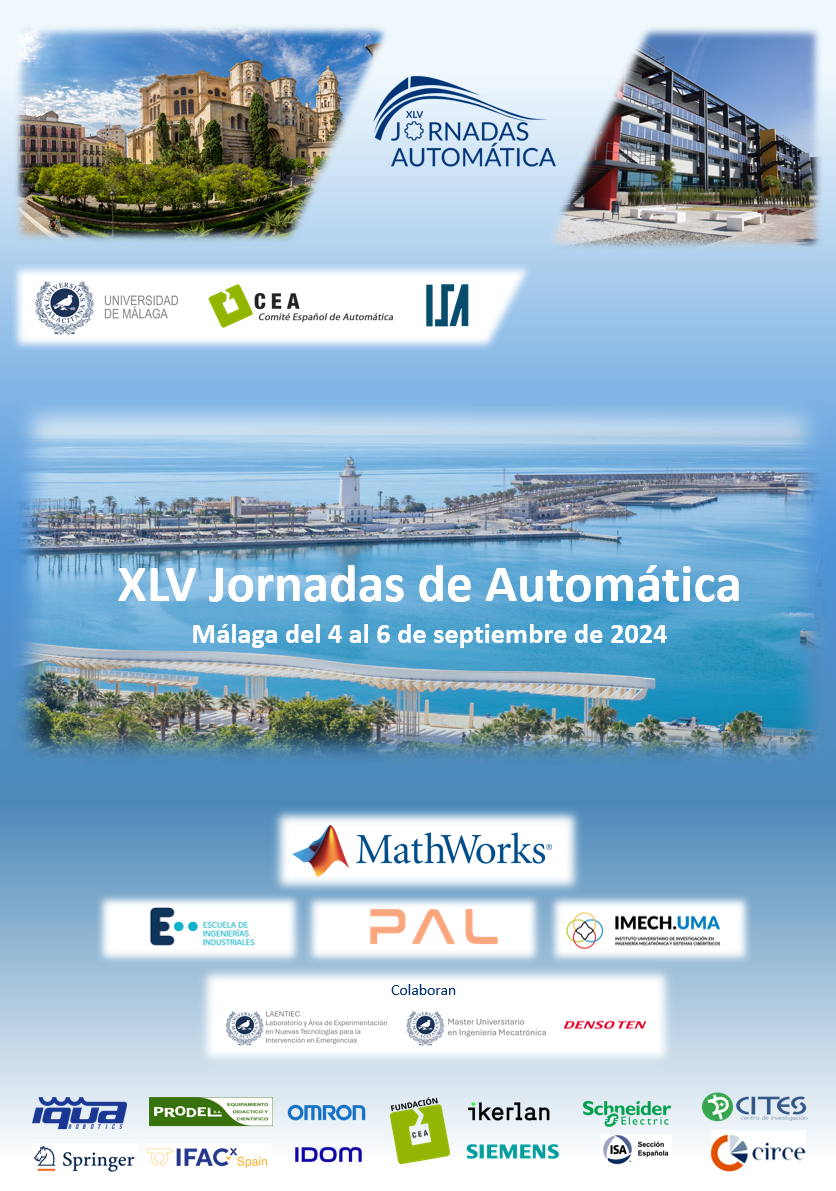Sistema de orientación de un aerogenerador empleando Fuzzy Logic Controller
DOI:
https://doi.org/10.17979/ja-cea.2024.45.10825Palabras clave:
Control Inteligente, Lógica Borrosa Multiobjetivo, Energía Renovable, Aerogenerador, OrientaciónResumen
A la hora de generar energía eléctrica empleando aerogeneradores para aprovechar la fuerza del viento, hay que tener en cuenta que estos han de orientarse de forma correcta respecto al mismo; ya que de no hacerlo, no serán capaces de aprovechar la energía disponible, e incluso podrán producirse cargas y efectos anómalos que pueden perjudicar el conjunto de la máquina de forma estructural. En este trabajo se pretende obtener empleando un controlador con lógica borrosa (Fuzzy Logic Controller, FLC), un sistema que mantenga la orientación correcta del aparato. Para ello, se presentará un modelo de planta adecuado, para a continuación comentar la lógica que ha de seguir el control debido a las características del modelo. Al final, se validará todo mediante simulaciones en las que el modelo obtenido tendrá que mantener la orientación ante distintas casuísticas, y por último e comentarán las conclusiones extraídas de la realización del trabajo.Referencias
Bu, F., Huang, W., Hu, Y., Xu, Y., Shi, K., Wang, Q., 2009. Study and implementation of a control algorithm for wind turbine yaw control system. In: 2009 World Non-Grid-Connected Wind Power and Energy Conference. pp. 1–5. DOI: 10.1109/WNWEC.2009.5335830
Burton, T., 2021. Wind Energy Handbook. 3ed. John Wiley & Sons. Cetinay, H., Kuipers, F. A., Guven, A. N., 2017. Optimal siting and sizing of wind farms. Renewable Energy 101, 51–58. DOI: 10.1016/j.renene.2016.08.008
Farret, F., Pfischer, L., Bernardon, D., 2000. Active yaw control with sensorless wind speed and direction measurements for horizontal axis wind
turbines. In: Proceedings of the 2000 Third IEEE International Caracas Conference on Devices, Circuits and Systems (Cat. No.00TH8474). pp. I25/1–I25/6. DOI: 10.1109/ICCDCS.2000.869856
GlobalWind Energy Council, 2020. Global wind energy council. global wind 2019 report annual market update. Report. IEC, 2019. Iec-61400-1. 4ed. Tech. rep., IEC.
Kragh, K. A., Hansen, M. H., 2015. Potential of power gain with improved yaw alignment. Wind Energy 18 (6), 979–989. DOI: 10.1002/we.1739
Mesemanolis, A., Mademlis, C., 2014. Combined maximum power point and yaw control strategy for a horizontal axis wind turbine. In: 2014 International Conference on Electrical Machines (ICEM). pp. 1704–1710. DOI: 10.1109/ICELMACH.2014.6960412
Piao, H., Wang, Z., 08 2008. A new control algorithm for yaw control system of wind turbine. Taiyangneng Xuebao/Acta Energiae Solaris Sinica 29, 1028–1033.
Red Eléctrica Española, 2023. Informe del sistema eléctrico 2022. Report.
Simley, E., Pao, L. Y., 7 2012. Lidar wind speed measurements of evolving wind fields. URL: https://www.osti.gov/biblio/1047935 DOI: 10.2172/1047935
Sun, H., Qiu, C., Lu, L., Gao, X., Chen, J., Yang, H., 2020. Wind turbine power modelling and optimization using artificial neural network with wind field experimental data. Applied Energy 280, 115880. DOI: 10.1016/j.apenergy.2020.115880
Wu, K. C., Joseph, R., Thupili, N., 1993. Evaluation of classical and fuzzy logic controllers for wind turbine yaw control. In: Proceedings. The First IEEE Regional Conference on Aerospace Control Systems, pp. 254–258. DOI: 10.1109/AEROCS.1993.720937
Yang, J., Fang, L., Song, D., Su, M., Yang, X., Huang, L., Joo, Y. H., 2021. Review of control strategy of large horizontal-axis wind turbines yaw system. Wind Energy 24 (2), 97–115. DOI: 10.1002/we.2564
Descargas
Publicado
Número
Sección
Licencia
Derechos de autor 2024 Roberto Díaz Barrio, Matilde Santos Peña, Carlos Armenta Déu

Esta obra está bajo una licencia internacional Creative Commons Atribución-NoComercial-CompartirIgual 4.0.





